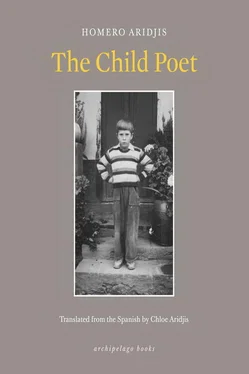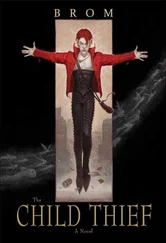Next to the market, in a dusty lot, a family of circus people had set up a tent for the fair in October. Among the advertised attractions was the man without arms, “fallen to earth one moonless night from a spaceship,” according to the handwritten paper sign hanging over his head. The man without arms, the circus barker cried, could light a cigarette, fry an egg, untie a knot, and play cards with his feet. These were the feats he performed during the show, sitting in the center of the ring, dressed in black like a priest, his cheeks painted like a clown’s. He would go through his act in silence, exasperating the audience with his slowness, spending too long opening a package or uncorking a bottle of wine, investing too many minutes in the eating of an egg with a knife and fork. But just as the audience began to display traces of boredom, murmuring among themselves or shifting in their seats, the man without arms would lift himself abruptly from the floor, thrusting himself upwards like a rag doll and disappear offstage in a dance.
Once the performance had drawn to a close amid whistles and applause, two sibling trapeze artists would appear, a man and woman in bathing suits, announced by a loudspeaker. Almost immediately afterwards they were joined by a dwarf, whose nose was painted red like a tomato. The dwarf seemed to have normal proportions when seated, but the moment he stood up you noticed his lower limbs were extremely short.
Maize the dwarf, dressed in blue, wearing clown shoes, and always ceremonious, would imitate his companions, falling repeatedly from his trapeze, half a meter high. His charm stole the show and few paid attention to the real trapezists.
The female trapeze artist, whose legs were brown and chunky, reappeared, this time in a sequined suit, and walked the wire. She teetered clumsily to keep her balance while the man without arms, who was her uncle, watched from below.
The teenage boys would follow her legs rather than the act, and when she bent over, in her generous brassiere and her tight panties, there was something almost obscene in her manner.
My brother had fallen in love with her, and wanted to run away with her once the circus left town. In the meantime, he attended every show.
But my father was aware of his intentions, and asked me to keep an eye on him.
I’d follow him down the streets and through the rooms of our house, listening as he spoke to himself, watching him leaning against the fig tree as he stared at his own shadow for hours.
He seemed not to see or hear me. And if he did, it was with the blindness and deafness of someone who is near us but whose thoughts are far away.
After the show I would find him with the trapeze artist in the darkness of a portico on the edge of town, clinging to her as if their bodies were one. I could hear, while I waited, the coyotes howling in the hills.
After a while of being glued to each other, they would part ways and take different streets.
And he would have left the village with her had he not seen her entering the cacique’s house one Saturday night after they’d said goodbye, staying inside with him and not coming out the entire time we waited outside.
The cacique had killed Quedito’s father. He’d taken him by surprise as he climbed the stairs leading up to the school to fetch his son. The cacique had shot him in the back from down below, halting him midway between two steps, the bullets thrusting his body upwards for a moment before he tumbled down, in a matter of seconds, the stairs that had taken him ten minutes to climb.
We were in class at the time and heard the shots. One. Two. Three. While our teacher talked on about the Sierra Madre …
Quedito, seated next to me, barely stirred when he heard the gunshots, unaware they were connected to his life.
Then we heard the voices of the younger pupils, whose classroom windows overlooked the stairs
“The cacique has killed Don Manuel,” someone shouted.
And we saw several people tearing through the yard.
Our teacher forbade us to leave the classroom. She ordered us to remain quietly seated. None of us could resist looking over at Quedito, who sat next to me as if frozen, with his mouth open.
“Come,” the teacher said to him. “Let’s go see what’s happening.”
He didn’t move.
So she took him by the arm and insisted. “Stand up. I’ll take you home.”
And she helped him up from his chair, his legs numb, unable to take a step.
“Can’t you walk?” she asked.
Quedito didn’t answer, as if she were addressing someone else or he couldn’t understand her words.
So I said to him, “Quedito, the teacher says she’ll take you home.”
He looked at me and shrugged, and stood staring at our teacher, his face like a shattered windowpane, about to break into sobs.
“Let’s go,” she said. “Shall we go see what happened?”
At first Quedito wouldn’t budge … He then began to walk on tiptoes towards the door and as soon as he got close to it broke into a run.
The teacher ran after him, losing a shoe on the way. And we ran after her, to see Quedito rushing down the stairs four at a time, always on the verge of tumbling down, his eyes desperately searching for his father, who’d already been picked up and taken home.
One student said:
— They got him in the chest.
Another:
— In the stomach.
Another:
— In the hand.
And they’d point to the stretch of stairs Don Manuel had been mounting the moment he received the gunshots.
And one young pupil, pale with excitement, descended the stairs with his gaze.
The next day, in the square, I encountered the cacique.
Leaning against a lamppost, he straightened himself upon seeing me, staring so intently his eyes seemed to bulge with a wrath he wished to vent on me.
I stood still, not daring to walk any farther.
He had a magnetism like a serpent’s, which fascinated me, his smile contorted into a kind of evil sensuality. He had killed a man: that’s what gave him prestige.
The spilt blood could be read in his eyes like a sign, lending his spirit tension, pleasure, and guilt, somewhere between satisfaction and horror.
Bent over, as if about to pounce, he watched me closely. Maybe he took pleasure in scaring me, as he did the woman who walked past at that moment; he jumped at her with a cry, and she ran away, terrified.
He didn’t laugh. He was like a dog that barks and growls by instinct.
And thus he bared his teeth at me, and began to growl. And he held up his hands as if they were claws. He was attuned to my movements, my glances, my fears. Ready to pounce. Offering me a glimpse of the revolver tucked under his belt, over the white shirt with a black ribbon at his neck. Dressed elegantly, as if for Sunday.
In his crocodile shoes, he stood between two policemen with rifles who also watched me while they checked the side streets as if sifting the air, making sure someone they hadn’t seen wasn’t approaching unawares. Their ponchos smelled of wet wool, their hats nearly covered their foreheads. They wore new shoes, which appeared to be either too tight or not the right size, judging by the fidgety way they were standing.
It looked like the cacique had deliberately placed himself at the center of the square to attract attention, perhaps as a gesture of defiance, or to assert his solitary tyranny.
All of a sudden, as if spitting out his voice, he said to me, “Where are you going, you pip-squeak son of a bitch?”
My breath was cut short.
“Okay, now that you’ve seen me, scram. Otherwise I’ll geld you.”
And I took flight, turning to look at him, his face still contorted and unsmiling, gazing around with a crazed look, still flanked by the two police officers, who laughed, yelling threats and insults at me.
Читать дальше












